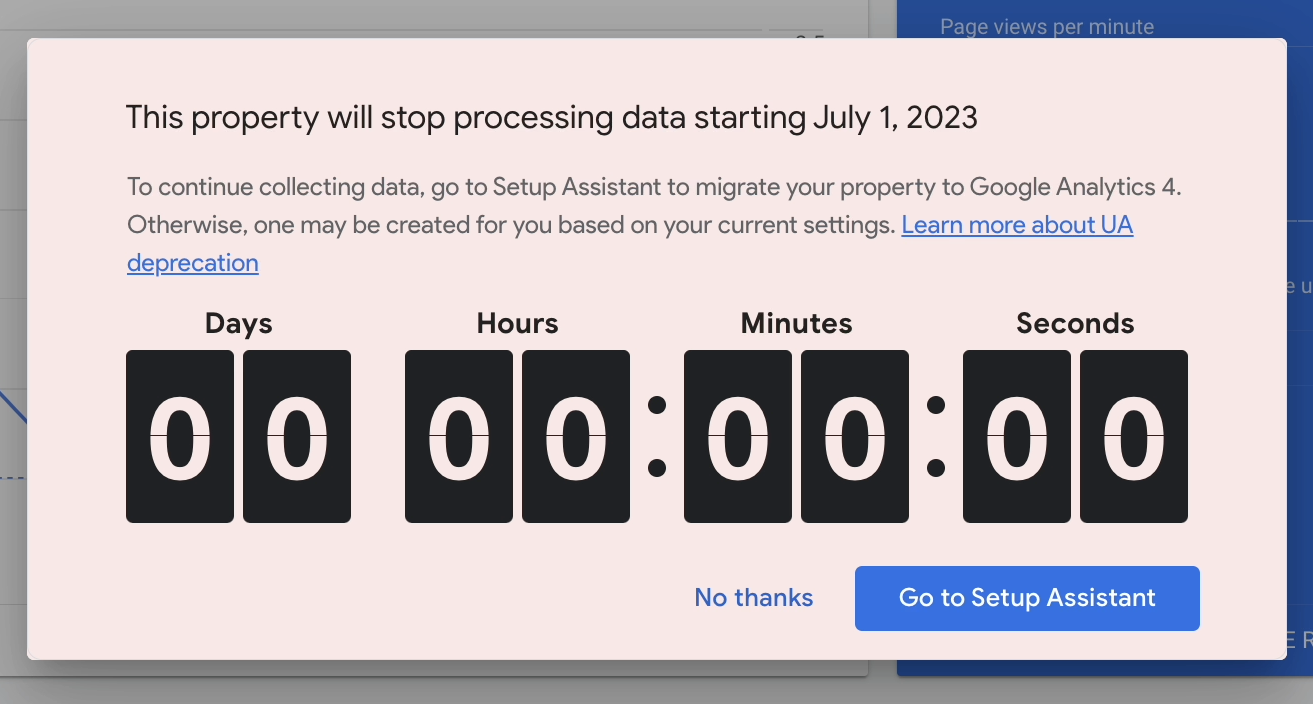Did you forget to complete your properties’ Google Analytics 4 (GA4) setup before the Universal Analytics (UA) deprecation on July 1?
Today, we begin shutting down Universal Analytics as we welcome you to Google Analytics 4. This will not happen overnight, so some Universal Analytics properties may continue to process data. However, all properties have now been added to the queue, and those that have not…
— Google Analytics (@googleanalytics) July 1, 2023
If so, Google Analytics may have created a new GA4 property for you based on the settings from your UA properties when the countdown timer hit zero at midnight.
 Screenshot from Google Analytics, July 2023
Screenshot from Google Analytics, July 2023Alternatively, you may see a message at the top of your Google Analytics dashboard prompting you to complete the GA4 setup:
 Screenshot from Google Analytics, July 2023
Screenshot from Google Analytics, July 2023No matter what state you found your Google Analytics in today, there is no need to panic. We’ve you covered!
Google Analytics 4 Guides
The following GA4 resources should help ease the forced migration from Universal Analytics to Google Analytics 4.
How To Properly Set Up, Read & Utilize Google Analytics 4
In this upcoming webinar on July 12, Drew Blumenthal, Founder & CEO of Digital Drew SEM, will teach you how to:
- Set up GA4 correctly so you don’t miss out on crucial benefits.
- Read and understand the new standard GA4 reports.
- Apply this information to level up your strategy moving forward.
You will also get a detailed explanation of the new metrics that mean the most to your business.
Automatically Created Google Analytics 4 Properties
This article informs Google Analytics users that, due to the replacement of UA by GA4, they should transition before July 1, 2023.
Should users choose not to transition, Google offers to assist users by automatically creating a GA4 property and copying settings from Universal Analytics unless the user opts out.
However, it is recommended to migrate settings for more accurate configuration manually.
The page also provides detailed instructions on opting out of the automatic creation and managing settings if you have already created a GA4 property. It emphasizes that the automated GA4 properties will only have basic features, suggesting users explore and set up additional features according to their needs.
Make The Switch To Google Analytics 4
This page includes specific tips and tools for the GA4 migration, including the GA4 Setup Assistant and migration tools for goals, users, and Google Ads links.
It also addresses advanced setup needs that involve mapping custom events, migrating ecommerce measurements, importing data, linking to BigQuery, employing User-ID for cross-platform reporting, utilizing the measurement protocol, and referencing a guide to match Universal Analytics functionalities with GA4 features.
7 Common Google Analytics 4 Configuration Mistakes To Avoid
This article explores common GA4 configuration mistakes that could cause you to lose historical data, affect data reliability, and distort your conversion tracking.
By understanding the potential pitfalls now, you can ensure your website analytics will capture accurate data you can trust for business intelligence.
Introducing The Next Generation of Analytics
Here, Google introduces GA4 as the evolution of Analytics. In contrast to the session-based data used by the now deprecated UA, GA4 focuses on events and incorporates privacy features, including cookieless tracking and behavioral modeling.
Moreover, GA4 boasts predictive analytics without the need for intricate models and directly integrates with media platforms to facilitate targeted actions on your website or app.
Start by finding the best steps for getting started with Google Analytics 4. Then dive into guides about GA4 events, conversions, lead generation, reporting, ecommerce, and more.
Google Analytics 4 Event Tracking: How To Get Set Up
While GA4 automatically collects information about basic events like clicks, downloads, and page views, custom event tracking can be tailored to collect more comprehensive data about your website visitor activity.
This guide details what you need to know to set up custom event tracking in GA4 manually.
A Step-By-Step Guide To Creating Segments And Audiences In GA4 With Examples
The article provides a step-by-step guide to creating segments and audiences in Google Analytics 4, highlighting the improved audience creation capabilities and the ability to analyze user behavior across multiple devices.
It also explains the differences between segments and audiences and provides examples of user, session, and event segments.
GA4: The Good, The Bad, And The Alternatives
This analysis explores the pros and cons of using GA4, plus alternatives to Google that can help you track your website visitors to inform your marketing and advertising strategies.
The Latest Google Analytics News
In addition to the guides above, the following covers the latest news in Google Analytics 4 developments that could help you decide whether to switch to GA4 or look for alternatives.
According to BuiltWith, 50% or more of the top websites use Google Analytics. Recent data from the technology lookup service indicated a total of almost 38 million live websites using Google Analytics, but only 11 million live websites using Google Analytics 4.
Stay Calm, Track On
The transition to GA4 from UA may seem challenging, but there’s no need to let it bring drama into your life. Unless you find drama entertaining.
But in all seriousness, GA4 could bring numerous advantages and enhanced features for marketers and analysts with a more flexible audience builder, combined data from web and app views, and the ability to create comprehensive user profiles across devices to offer valuable insights.
Despite the initial learning curve, embracing GA4 empowers businesses to gain a deeper understanding of user behavior, optimize marketing strategies, and make data-driven decisions for better results in the long run.
We hope these resources help make the transition into the new version of Google Analytics easier!
Featured image: sdx15/Shutterstock
